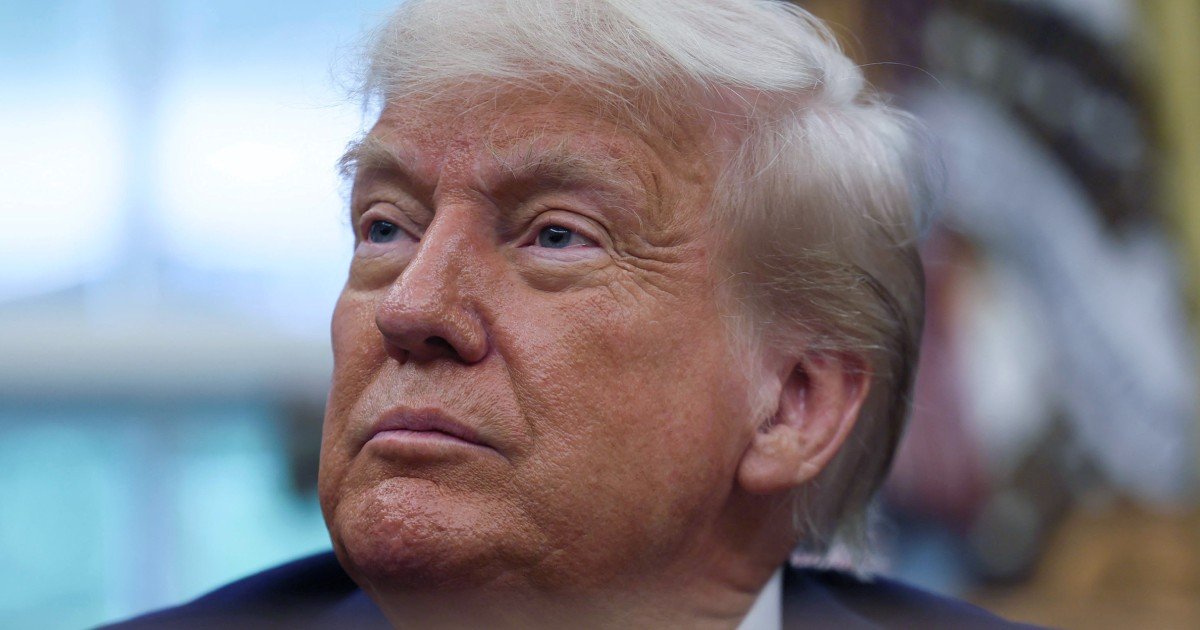Morning Rundown: A major de-escalation in trade war with China, Hamas to release U.S. citizen and Trump admin’s threat to suspend habeas corpus
Profile
Sections
Local
tv
Featured
More From NBC
Follow NBC News
news Alerts
There are no new alerts at this time
U.S. Treasury yields moved higher on Monday after the U.S. and China agreed to slash tariffs on each other’s goods, in a move welcomed by investors.
At 5:09 a.m. ET, the 10-year Treasury yield was up nearly 6 basis points to 4.433%, while the 2-year Treasury yield jumped 10 basis points to 3.996%
One basis point is equal to 0.01% and yields and prices move in opposite directions.
Read the full story here.
Global technology and chip stocks rallied today after the U.S. and China agreed to pause most tariffs on each other’s goods.
Technology stocks — such as semiconductor firms and smartphone makers — have been hit hard as trade tensions between the world’s two largest economies threatened to disrupt supply chains and hurt some of the biggest U.S. businesses.
But investors breathed a sigh of relief after talks between the U.S. and China over the weekend yielded a temporary pause in “reciprocal” tariffs.
Read the full story here.
Secretary of State Marco Rubio emphasized the administration’s support for a ceasefire between India and Pakistan during a call with his British counterpart, David Lammy, last night, the State Department said.
“The Secretary expressed U.S. support for direct dialogue between India and Pakistan and encouraged continued efforts to improve communications,” State Department spokesperson Tammy Bruce said in a statement.
On the conflict between Ukraine and Russia, Rubio told Lammy the government’s “top priority remains bringing an end to the fighting.”
Treasury Secretary Scott Bessent struck an optimistic tone about the future of U.S.-China trade, saying in a CNBC interview this morning that he thought a trade deal Trump signed with China during his first term could be a starting point for the two countries.
Bessent said there was “no sense of anxiety, there was a sense of moving forward” during this weekend’s talks.
“There was a sense of mutual respect,” he said. “There was a sense that we had shared interests.”
Bessent emphasized that the U.S. does not want “a generalized decoupling from China.”
“What we do want is a decoupling for strategic necessities which we were unable to obtain during Covid, and we realized that efficient supply chains were not resilient supply chains,” he said.
Bessent said the two sides now have a “meeting mechanism,” noting that “I would imagine that in the next few weeks, we will be meeting again to get rolling on a more fulsome agreement.”
Trump will return to familiar ground in Saudi Arabia this week, choosing the kingdom as the destination for his first major foreign trip of his second term, just as he did in 2017 — once again bypassing the traditional allies who have usually hosted presidents.
The decision underscores a broader Trump White House strategy, prioritizing the Middle East’s economic and strategic influence over North America’s deep-rooted trade and security ties.
Read the full story here.
Trump mocked last night Democratic backlash to his administration’s plan to accept a Boeing super luxury jet, estimated to be worth hundreds of millions of dollars.
“So the fact that the Defense Department is getting a GIFT, FREE OF CHARGE, of a 747 aircraft to replace the 40 year old Air Force One, temporarily, in a very public and transparent transaction, so bothers the Crooked Democrats that they insist we pay, TOP DOLLAR, for the plane,” Trump wrote on Truth Social, in a post that goes on to call the party “world class losers.”
Democrats roundly criticized reports that Trump was planning to accept the gift, arguing it violates a provision of the Constitution that bars federal officials from accepting gifts from foreign governments without Congressional consent.
Rep. Ritchie Torres, D-N.Y., called for an investigation into the gift on Sunday, describing it as a “flying grift” that is the “most valuable gift ever conferred on a President by a foreign government.”
“Rather than enforcing ethics, the Attorney General has affixed the Department of Justice’s seal of approval to a transaction that flagrantly violates both the letter and the spirit of the Constitution’s Emoluments Clause,” Torres wrote in a letter to the head of the Government Accountability Office, the acting Inspector General of the Defense Department and the acting director of the Office of Government Ethics.
White House Press Secretary Karoline Leavitt said on Sunday that “any gift given by a foreign government is always accepted in full compliance with all applicable laws.”
Trump is set to sign an executive order today at 9 a.m. that aims to lower prescription drug prices, according to a Truth Social post published yesterday.
Trump said he would sign an order reducing prices “almost immediately” by 30% to 80%.
Prescription drugs in the U.S. can cost up to 10 times more than in other countries of the same size and wealth, according to public policy think tank the Rand Corporation. The order is expected to institute a pricing model dubbed the “most favored nation” approach, in which the U.S. pays no more for drugs than the lowest prices paid by other wealthy nations. The president tried to enact a similar policy during his first term, but hit an obstacle after a lawsuit from the pharmaceutical industry.
The order would come on the heels of another action regarding pharmaceuticals. Trump signed an order last week promoting the manufacturing of pharmaceuticals in the U.S.
The United States and China said Monday they had agreed to a 90-day pause on most of the tariffs they have imposed on each other since last month, in a major step toward easing a trade war between the two powers that has rattled the global economy.
U.S. tariffs on Chinese imports will be cut to 30% from 145%, while China’s levies on U.S. imports will be cut to 10% from 125%, the two countries said in a joint statement.
Read the full story here.
© 2025 NBCUniversal Media, LLC



